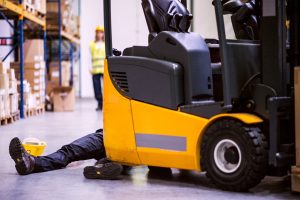With the growth of online sales and home deliveries, warehouse and logistics facilities are an increasingly important part of many businesses. Whilst there are health and safety recommendations as well as legislation designed to protect people working in warehouses, people can still be injured. If you have been hurt while performing your work duties, you may be able to make a warehouse accident claim.
We will discuss the duty of care you are owed while working, and how you may be able to make a personal injury claim if this duty is breached. To help with this, we will also provide you with examples of different warehouse accidents that you may be able to claim for.
Having enough evidence to support your case is also crucial when making a workplace injury claim. Therefore, we will provide you with examples of evidence you could gather. Additionally, we explain how your compensation may be calculated and how a No Win No Fee solicitor from our panel could help you with claiming this.
If you have any questions regarding how to claim for a warehouse accident or would like to discuss your specific case, you can contact our advisory team:
- Talk to us using the live chat pop-up
- Contact us online to organise a callback.
- Call a member of our team on 0800 408 7825 to discuss your case today.
Browse Our Guide To Warehouse Accident Claims
- Can You Make A Warehouse Accident Claim?
- What Are Common Types Of Warehouse Accidents?
- What Do You Need To Claim For Warehouse Accidents?
- How Much Compensation For A Warehouse Accident Claim?
- Why Claim Warehouse Accident Compensation On A No Win No Fee Basis?
- Read More About Claiming For An Accident At Work
Can You Make A Warehouse Accident Claim?
Under The Health and Safety at Work etc. Act 1974 (HASWA), your employer owes you a duty of care. They are required to carry out reasonable steps to prevent you from coming to harm while working and in the workplace.
To be eligible to make a warehouse accident claim, your case must be able to meet the following criteria:
- You were owed a duty of care by your employer when the accident occurred.
- This duty was breached. For example, your employer failed to provide you with any manual handling training before asking to to lift and carry a load.
- This breach caused you to suffer an injury. This could be a physical or psychological injury.
To see whether you may be eligible to make a warehouse accident compensation claim, you can contact a member of our advisory team.
What Are Common Types Of Warehouse Accidents?
Warehouses can be large and complex workplaces, with employees carrying out various tasks, such as loading and unloading vehicles, manual handling operations, the use of lift trucks, and storing objects at heights.
As aforementioned, if an employer fails to adhere to their duty of care, this could lead to a minor or serious accident at work, in which employees are injured.
Some examples of how a warehouse accident could happen include:
- Faulty equipment: For example, your employer asks you to operate a forklift with faulty breaks. They are aware of the faulty breaks but have made no steps to fix or replace them. Due to this, you are unable to stop the vehicle safely and crash into a wall, suffering multiple injuries.
- Lack of training: Your employer did not provide you with any manual handling training before asking you to carry a load. Due to poor lifting techniques and dropping the load whilst you were carrying it, you suffer various injuries.
- Lack of risk assessments: Due to your employer failing to perform any risk assessments, they fail to realise that there is poor lighting on the stairways within your warehouse job. This leads to you falling down the stairs due to being unable to see and suffering injuries.
What Are Common Injuries To Warehouse Workers?
There are various types of injuries that could be suffered should a warehouse accident occur. Some examples could include:
- Fractured or broken bones.
- Joint injuries, such as dislocations or soft tissue injuries.
- A brain or head injury.
- A serious spinal or back injury.
- Bruises, cuts and lacerations.
To see whether you may be eligible to make a warehouse accident claim for your specific case, you can contact a member of our advisory team.
What Do You Need To Claim For Warehouse Accidents?
In order to make any type of personal injury claim, you need evidence to support your case. The evidence you gather needs to show how your employer was liable for the accident and the subsequent injuries you suffered.
Examples of evidence which could help support warehouse accident compensation claims include:
- Photos or videos which show the accident taking place. This might include workplace CCTV footage.
- Witness contact details, such as your colleagues. They may be able to provide a statement letter into the claims process.
- Medical evidence of the injuries sustained, such as your medical records.
- Copies of records from the accident report book in your workplace.
- Evidence of any financial losses you have suffered. This could include payslips, bank statements, receipts and invoices.
A No Win No Fee solicitor from our panel could help you to gather evidence for your warehouse accident claim as part of their services.
How Can Warehouse Accidents Be Prevented?
As discussed above, there are various ways in which warehouse accidents could occur. Employers could take various steps to prevent warehouse workers from being injured in the workplace.
Examples of how warehouse accidents could be prevented may include:
- Providing the right personal protective equipment (PEE) when needed.
- Providing all employees with correct and up-to-date training to perform their work duties.
- Conducting risk assessments and implementing processes as necessary.
- Regularly maintaining workplace equipment and machinery.
If you have been injured while at work, and would like to know whether a solicitor on our panel could help you with making a warehouse injury compensation claim, you can contact our advisors.
How Much Compensation For A Warehouse Accident Claim?
If you intend to make a claim, you may be wondering how much compensation you could be awarded. The amount of compensation you could receive will depend upon what injuries you sustained, how serious these were and other unique factors affecting your case.
Compensation for successful personal injury claims could consist of two heads of loss. The first is general damages which is awarded for the pain and suffering your injuries have caused you to experience.
The Judicial College Guidelines (JCG) is a document that may be referred to by those calculating your claim for general damages. This is because the JCG lists compensation guidelines for a range of different injuries.
The table below includes some of these compensation guidelines for different injuries. Please note, that this table should only be used as a guide and that the first entry has not been taken from the JCG.
Compensation Table
| Type Of Injury | Severity | Compensation Guidelines |
|---|---|---|
| Multiple serious injuries and special damages | Serious | Up to £1,000,000+ |
| Brain damage | Very Severe (a) | £344,150 to £493,000 |
| Brain damage | Moderately Severe (b) | £267,340 to £344,150 |
| Arm injuries | Severe (a) | £117,160 to £159,770 |
| Leg injuries | Severe (b) (ii) Very Serious | £66,920 to £109,290 |
| Hand injuries | Serious (e) | £35,390 to £75,550 |
| Injuries affecting sight | Loss Of Sight In One Eye (e) | £60,130 to £66,920 |
| Back injuries | Moderate (b) (i) | £33,880 to £47,320 |
| Back injuries | Moderate (b) (ii) | £15,260 to £33,880 |
| Foot injuries | Moderate (f) | £16,770 to £30,500 |
| Facial disfigurement | Less significant scarring (d) | £4,820 to £16,770 |
Special damages is the other head of loss you may be awarded. It is designed to compensate for both past and future financial losses incurred as a result of your injuries. As we discussed earlier in this guide, you will need to supply evidence to prove these losses when claiming special damages.
Examples of what special damages could be awarded for include:
- Medical care, treatment or medication.
- Travel costs to and from medical appointments.
- Lost income and workplace benefits due to time off work.
- The cost of renovating or adapting your home, such as adding a stair lift if you are no longer able to get upstairs.
Is There A Time Limit When Making A Warehouse Injury Claim?
Any personal injury claim must be started within the correct time limit. The Limitation Act 1980 sets out this time limit as three years from the date your accident took place.
Those who have been injured as a minor or those lacking the mental capacity to handle their own claim will have exceptions applied to the time limit.
For further guidance on how long you have to claim for an accident at work or to learn what exceptions apply to the personal injury claims time limit, you can contact our advisors.
Why Claim Warehouse Accident Compensation On A No Win No Fee Basis?
Our panel of personal injury solicitors could help with warehouse accident claims. They are experienced in handling a variety of different types of workplace accident claims and could help you with gathering evidence and negotiating a settlement on your behalf.
Additionally, a personal injury solicitor on our panel may offer to work on your case under a Conditional Fee Agreement (CFA). When working with you under this No Win No Fee arrangement, you won’t need to make any upfront or ongoing payments towards their services. Additionally, if your claim fails, you will not be charged any fees for the work they have provided on your warehouse accident claim.
If your case is successful, the solicitor will charge a success fee. This is taken from your compensation as a percentage that is limited by the law.
To see whether a solicitor on our panel could help you with your accident at work claim, you can contact our advisors:
- Talk to us using the live chat pop-up
- Contact us online to organise a callback.
- Call a member of our team on 0800 408 7825 to discuss your case today.
Read More About Claiming For An Accident At Work
You can find out more about accident at work claims in our guides below.
- In this guide we look in more depth at forklift accident claims. Learn more about when you could claim for this type of warehouse accident.
- Carbon Monoxide Poisoning can happen in workplaces such as a warehouse. Find out more about when and how to claim in this guide.
- If you have had to take time off work, you may be womdering if you still receive full pay if injured at work. This guide aims to answer this question.
Further external resources:
- A guide to health and safety within warehouses from the Health and Safety Executive (HSE).
- Information from the NHS if you have suffered a slipped disc while at work.
- Guidance on when you may be eligible to receive statutory sick pay (SSP) from Gov.UK.
If you still have any questions about how to make a warehouse accident claim, please contact our team today.



